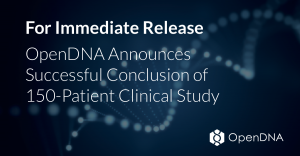OpenDNA Announces Successful Conclusion of 150 Patient Clinical Study
GAITHERSBURG, MD, UNITED STATES, June 8, 2023/EINPresswire.com/ -- Study Demonstrates the Utilization, Impact, and Precision of OpenDNA's AI-Powered Platform for Predicting Cardiovascular Disease Risk
OpenDNA, a leading provider of precision medicine AI solutions, today announced the successful conclusion of a clinical study that evaluated the utilization, impact, and precision of its AI-powered platform for predicting cardiovascular disease (CVD) risk. The study, which was conducted in three clinics in Maryland and New Jersey, enrolled 150 patients with a variety of risk factors.
"We are very pleased with this study," said Dr. Michael Chen MD, FACC, FSCAI, RPVI, Interventional Cardiologist at Adventist HealthCare Cardiac Associates. "The utilization, accuracy, impact, and precision of the OpenDNA platform have the potential to revolutionize the way we diagnose and treat CVD. We believe that OpenDNA's AI-powered platform can help clinicians identify patients who are at high risk for CVD and provide them with the care they need to prevent or delay the onset of the disease."
OpenDNA's platform is based on a deep learning algorithm that was trained on a large dataset of genetic and clinical data. The algorithm is able to identify patterns in the data that are associated with CVD risk. This information is then used to generate a personalized risk score for each patient.
The clinical study was conducted in three clinics in Maryland and New Jersey. The clinics were selected based on their diversity of patient populations and their commitment to providing high-quality care. The study enrolled 150 patients with a variety of risk factors, including age, gender, race, ethnicity, family history, and lifestyle factors.
The patients in the study were given a genetic test, and their clinical data were extracted from the EMR. The genetic test was used to collect data on the patient's DNA, and the clinical data was used to provide data on the patient's nongenetic risk factors. The data from the genetic test and the clinical data were then used to generate a personalized risk score for each patient.
OpenDNA's platform is currently being used by clinicians in the United States, Europe, and Israel. The company plans to continue to develop its platform and to expand its clinical trials in order to validate its utilization, accuracy, and precision further. The OpenDNA platform is commercially available in the United States and offered to patients in primary care and concierge medicine clinics.
About OpenDNA
OpenDNA is a leading provider of precision medicine AI solutions. The company's platform uses artificial intelligence to analyze genetic and clinical data to predict and treat complex polygenic diseases. OpenDNA's vision is to leverage the genomics revolution to bring precision medicine for chronic disease to the point of care. The company is headquartered in Haifa, Israel, and Maryland, USA.
Media Contact
Nir Gamliel, CBO, nir@open-dna.com
OpenDNA, a leading provider of precision medicine AI solutions, today announced the successful conclusion of a clinical study that evaluated the utilization, impact, and precision of its AI-powered platform for predicting cardiovascular disease (CVD) risk. The study, which was conducted in three clinics in Maryland and New Jersey, enrolled 150 patients with a variety of risk factors.
"We are very pleased with this study," said Dr. Michael Chen MD, FACC, FSCAI, RPVI, Interventional Cardiologist at Adventist HealthCare Cardiac Associates. "The utilization, accuracy, impact, and precision of the OpenDNA platform have the potential to revolutionize the way we diagnose and treat CVD. We believe that OpenDNA's AI-powered platform can help clinicians identify patients who are at high risk for CVD and provide them with the care they need to prevent or delay the onset of the disease."
OpenDNA's platform is based on a deep learning algorithm that was trained on a large dataset of genetic and clinical data. The algorithm is able to identify patterns in the data that are associated with CVD risk. This information is then used to generate a personalized risk score for each patient.
The clinical study was conducted in three clinics in Maryland and New Jersey. The clinics were selected based on their diversity of patient populations and their commitment to providing high-quality care. The study enrolled 150 patients with a variety of risk factors, including age, gender, race, ethnicity, family history, and lifestyle factors.
The patients in the study were given a genetic test, and their clinical data were extracted from the EMR. The genetic test was used to collect data on the patient's DNA, and the clinical data was used to provide data on the patient's nongenetic risk factors. The data from the genetic test and the clinical data were then used to generate a personalized risk score for each patient.
OpenDNA's platform is currently being used by clinicians in the United States, Europe, and Israel. The company plans to continue to develop its platform and to expand its clinical trials in order to validate its utilization, accuracy, and precision further. The OpenDNA platform is commercially available in the United States and offered to patients in primary care and concierge medicine clinics.
About OpenDNA
OpenDNA is a leading provider of precision medicine AI solutions. The company's platform uses artificial intelligence to analyze genetic and clinical data to predict and treat complex polygenic diseases. OpenDNA's vision is to leverage the genomics revolution to bring precision medicine for chronic disease to the point of care. The company is headquartered in Haifa, Israel, and Maryland, USA.
Media Contact
Nir Gamliel, CBO, nir@open-dna.com
Mir Gamliel
OpenDNA
240-401-9712
email us here

